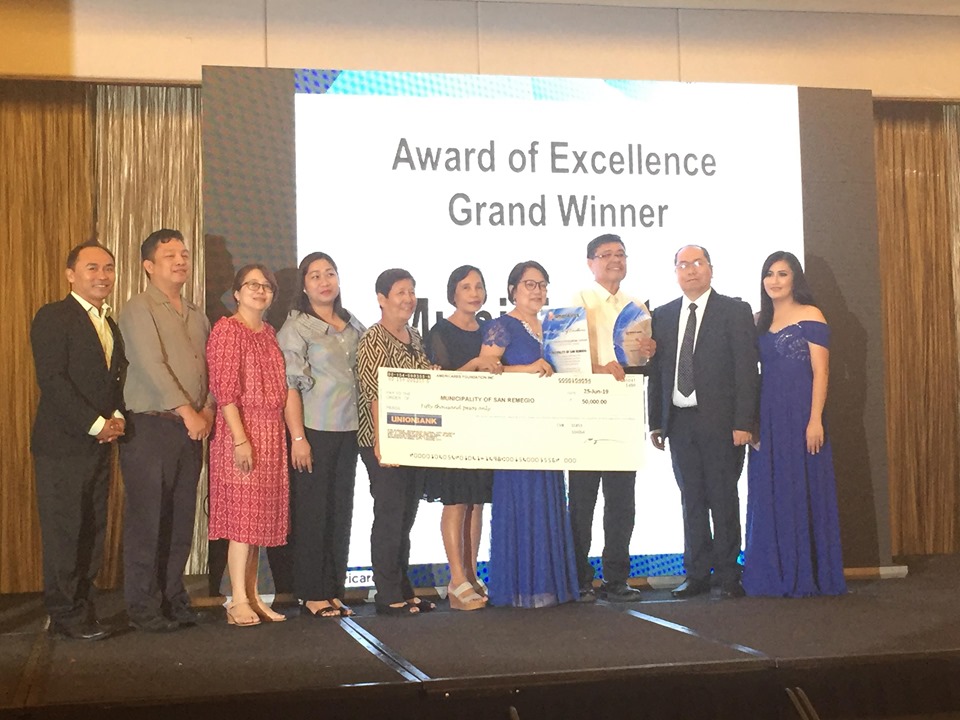
San Remegio Mayor Mariano Martinez (3rd from right) received a plaque and check amounting to P50,000 from Americares Philippines Country Director Paul Gwyn Pagaran (2nd from right) and Program Director Pearl Templado (right) during the Americares Philippines Awards for Excellence in Mental Health and Psychosocial Support held in a Cebu City hotel on June 27. /Rosalie O. Abatayo
CEBU CITY, Philippines— Individuals facing mental health problems were among the grim seen in San Remigio town as local and international humanitarian organizations came to extend assistance to the Super Typhoon Yolanda -affected families in 2013.
Non-government Organizations (NGOs) found mentally ill patients “hidden” by their relatives as they visited homes in the town located some 91.5 kilometers north of Cebu City.
“It was during that time that as an LGU, that was the very first time on my part that we realized that there was pala a big problem,” said San Remigio Mayor Mariano Martinez.
At first, Martinez said they did not have any idea on how to cater to the needs of constituents who were suffering from mental health problems.
They received guidance from Americares volunteers who visited their town after Super Typhoon Yolanda hit.
“That was when we saw the light and the direction on where we could be of help to our mentally challenge constituents,” Martinez said in an interview with CDN Digital.
Americares Philippines is an international NGO that works with government agencies, especially local government units (LGU) in addressing pressing health concerns including mental health care.
Last June 27, San Remigio town was recognized by Americare Philippines for having excelled in their implementation of their mental health support programs. The town also received a plaque and cash prize of P50, 000 which Martinez said will he use to augment their allocation for their mental health programs.
San Remigio, a third income class municipality in Cebu’s fourth legislative district, has at a total of 230 reported cases of mental health problems.
For the past six years, the town was able to craft and adopt resolutions providing for the implementation of mental health programs, facilitate training to equip their health workers with knowledge on the proper handling of mentally challenged clients, and appropriate funds for the purchase of medicine and organize psychosocial support activities for these patients.
Paul Gwyn Pagaran, Americares Philippines country director, said the selection of winners was based on how LGUs responded to the calls for mental health support.
“First criteria is governance which includes having a resolution or ordinance (passed) for the (implementation of a) mental health program, budget allocation for psychosocial support and the availability of medicines and medical supplies and the facility and staffing,” Pagaran said.
Americares Philippines also looked at how programs were implemented including mental health education among the constituents as well as how the LGUs kept and maintained the confidentiality of their clients’ records.
Eight local government units participated in Americares Philippines’ Awards of Excellence in Mental Health and Psychosocial Support. Five of these were shortlisted as finalists.
Borbon town was awarded the first runner up while Dalaguete town was named second runner up. The cities of Talisay and Naga were also cited as among the top five finalists.
“We want to recognize the LGUs and the health units on their efforts to promote mental health in their own localities,” Pagaran added.
Pagaran said they want to drum up support from the LGUs especially on the implementation of psychosocial interventions and the promotion of mental health by inspiring these with the release of recognitions.
Martinez said the award is an inspiration for LGUs to do more for their mentally challenged constituents especially with the growing demand for mental health interventions.
“In 2017, we had about 190 patients but now, we have 230. Instead of diminishing, it’s growing. But I dont think we have more mental health patients as before. It’s just that we are recognizing more people now,” Martinez said. /dcb